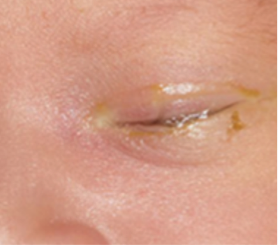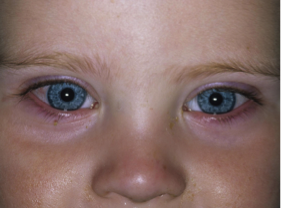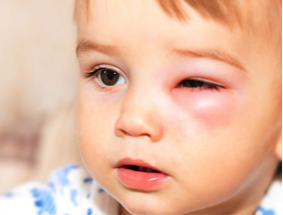Conjunctivitis
Conjunctivitis is a common eye condition that affects children, especially under 5 years of age. It can either be caused by an infection or by an allergy. Infectious conjunctivitis is contagious and may spread to other household members. Allergic conjunctivitis is more common in children with allergies such as hay fever.
If your child has any of the following:
- Eyeball is bulging out
- Vision loss
- Severe pain in eyes
- Breathing very fast or breathing that stops or pauses
- Working hard to breathe, drawing in of the muscles below the rib, unable to talk or noisy breathing (grunting)
- Becomes pale, blue, mottled and/or unusually cold to touch
- Difficult to wake up, very sleepy or confused
- Weak, high-pitched, continuous cry or extremely agitated
- Has a fit (seizure)
- A temperature less than 36oC or temperature 38oC or more if baby is less than 3 months
- Develops a rash that does not disappear with pressure and seems unwell (see the 'Glass Test')
You need urgent help.
Go to the nearest Hospital Emergency (A&E) Department or phone 999
If your child has any of the following:
- Eyeball is bulging out
- Vision loss
- Severe pain in eyes
- Breathing very fast or breathing that stops or pauses
- Working hard to breathe, drawing in of the muscles below the rib, unable to talk or noisy breathing (grunting)
- Becomes pale, blue, mottled and/or unusually cold to touch
- Difficult to wake up, very sleepy or confused
- Weak, high-pitched, continuous cry or extremely agitated
- Has a fit (seizure)
- A temperature less than 36oC or temperature 38oC or more if baby is less than 3 months
- Develops a rash that does not disappear with pressure and seems unwell (see the 'Glass Test')
You need to contact a doctor or nurse today.
Please ring your GP surgery or call NHS Wales 111 - dial 111
If your child has none of the above
Watch them closely for any change and look out for any red or amber symptoms.
Additional advice is also available for families for help cope with crying in otherwise well babies.
Self care
Continue providing your child’s care at home. If you are still concerned about your child, call NHS Wales111 – dial 111
Causes of conjunctivitis
Most cases of conjunctivitis in children are caused by an infection; your child may also have a runny nose, cough or earache.
Treatment
Most children with conjunctivitis do not need treatment with antibiotics - it takes the same amount of time to get better whether an antibiotic is used or not.
If your child has any features of severe infection (amber or red features above), they will need to be urgently seen by a healthcare professional who may decide that your child may benefit from antibiotic treatment. If your child is under 28 days of age and has a red eye(s) or large amounts of pus discharging from their eye(s), they need to be seen by a healthcare professional.
You can help relieve symptoms by gently cleaning the eye(s) with cotton balls soaked in warm water.
Clean in one direction only, outwards from the inside (nose side) of the eye. This prevents the other eye becoming infected if only one eye is affected.
Discard the cotton ball each time to prevent reinfection.
Do not try to clean inside the eyelids as this may cause damage to the inside of the eye. Lubricating eye drops such as 'artificial tears' may give some relief.
If your child wears contact lenses, make sure they stop using them until their symptoms have completely gone.


It can take up to 2 weeks for a child to fully recover from conjunctivitis . If your child is not improving after 2 weeks, you should take your child to see their GP.
Mild conjunctivitis - no treatment required (green)
Peri-orbital cellulitis - needs same day review (amber)

Prevention
To avoid conjunctivitis spreading to other family members, make sure all family member (and your children) wash hands regularly with warm soapy water and wash your child's pillows and face cloths in hot water and detergent. Avoid sharing towels and pillows.
Your child does not need to be excluded from school or childcare if they have conjunctivitis.
For wear and tear, minor trips and everything in between.
Self-care
You can treat your child's very minor illnesses and injuries at home.
Some illnesses can be treated in your own home with support and advice from the services listed when required, using the recommended medicines and getting plenty of rest.
Sound advice
Children can recover from illness quickly but also can become more poorly quickly; it is important to seek further advice if a child's condition gets worse.
For information on common childhood illnesses go to What is wrong with my child?
For wear and tear, minor trips and everything in between.
Self-care
You can treat your child's very minor illnesses and injuries at home.
Some illnesses can be treated in your own home with support and advice from the services listed when required, using the recommended medicines and getting plenty of rest.
Sound advice
Children can recover from illness quickly but also can become more poorly quickly; it is important to seek further advice if a child's condition gets worse.
For information on common childhood illnesses go to What is wrong with my child?
Pharmacists are experts in many aspects of healthcare and can offer advice on a wide range of long-term conditions and common illnesses such as coughs, colds and stomach upsets. You don’t need an appointment and many have private consultation areas, so they are a good first port of call. Your pharmacist will say if you need further medical attention.
Sound advice
- Visit a pharmacy if your child is ill, but does not need to see a GP.
- Remember that if your child's condition gets worse, you should seek further medical advice immediately.
- Help your child to understand - watch this video with them about going to the pharmacy.
For information on common childhood illnesses go to What is wrong with my child?
Pharmacists are experts in many aspects of healthcare and can offer advice on a wide range of long-term conditions and common illnesses such as coughs, colds and stomach upsets. You don’t need an appointment and many have private consultation areas, so they are a good first port of call. Your pharmacist will say if you need further medical attention.
Sound advice
- Visit a pharmacy if your child is ill, but does not need to see a GP.
- Remember that if your child's condition gets worse, you should seek further medical advice immediately.
- Help your child to understand - watch this video with them about going to the pharmacy.
For information on common childhood illnesses go to What is wrong with my child?
Health visitors are nurses or midwives who are passionate about promoting healthy lifestyles and preventing illness through the delivery of the Healthy Child Wales Programme. They work with you through your pregnancy up until your child is ready to start school.
Health Visitors can also make referrals for you to other health professionals for example hearing or vision concerns or to the Community Paediatricians or to the child and adolescent mental health services.
Contact them by phoning your Health Visitor Team or local Children’s Centre.
Sound advice
Health visitors also provide advice, support and guidance in caring for your child, including:
- Breastfeeding, weaning and healthy eating
- Exercise, hygiene and safety
- Your child’s growth and development
- Emotional health and wellbeing, including postnatal depression
- Safety in the home
- Stopping smoking
- Contraception and sexual health
- Sleep and behaviour management (including temper tantrums!)
- Toilet training
- Minor illnesses
For more information watch the video: What does a health visitor do?
Health visitors are nurses or midwives who are passionate about promoting healthy lifestyles and preventing illness through the delivery of the Healthy Child Wales Programme. They work with you through your pregnancy up until your child is ready to start school.
Health Visitors can also make referrals for you to other health professionals for example hearing or vision concerns or to the Community Paediatricians or to the child and adolescent mental health services.
Contact them by phoning your Health Visitor Team or local Children’s Centre.
Sound advice
Health visitors also provide advice, support and guidance in caring for your child, including:
- Breastfeeding, weaning and healthy eating
- Exercise, hygiene and safety
- Your child’s growth and development
- Emotional health and wellbeing, including postnatal depression
- Safety in the home
- Stopping smoking
- Contraception and sexual health
- Sleep and behaviour management (including temper tantrums!)
- Toilet training
- Minor illnesses
For more information watch the video: What does a health visitor do?
School nurses care for children and young people, aged 5-19, and their families, to ensure their health needs are supported within their school and community. They work closely with education staff and other agencies to support parents, carers and the children and young people, with physical and/or emotional health needs.
Contacting the School Nurse
Primary and secondary schools have an allocated school nurse – telephone your child’s school to ask for the contact details of your named school nurse.
There is also a specialist nurse who works with families who choose to educate their children at home.
Sound Advice
Before your child starts school your health visitor will meet with the school nursing team to transfer their care to the school nursing service. The school nursing team consists of a school nursing lead, specialist public health practitioners and school health staff nurses.
They all have a role in preventing disease and promoting health and wellbeing, by:-
- encouraging healthier lifestyles
- offering immunisations
- giving information, advice and support to children, young people and their families
- supporting children with complex health needs
Each member of the team has links with many other professionals who also work with children including community paediatricians, child and adolescent mental health teams, health visitors and speech and language therapists. The school health nursing service also forms part of the multi-agency services for children, young people and families where there are child protection or safeguarding issues.
School nurses care for children and young people, aged 5-19, and their families, to ensure their health needs are supported within their school and community. They work closely with education staff and other agencies to support parents, carers and the children and young people, with physical and/or emotional health needs.
Contacting the School Nurse
Primary and secondary schools have an allocated school nurse – telephone your child’s school to ask for the contact details of your named school nurse.
There is also a specialist nurse who works with families who choose to educate their children at home.
Sound Advice
Before your child starts school your health visitor will meet with the school nursing team to transfer their care to the school nursing service. The school nursing team consists of a school nursing lead, specialist public health practitioners and school health staff nurses.
They all have a role in preventing disease and promoting health and wellbeing, by:-
- encouraging healthier lifestyles
- offering immunisations
- giving information, advice and support to children, young people and their families
- supporting children with complex health needs
Each member of the team has links with many other professionals who also work with children including community paediatricians, child and adolescent mental health teams, health visitors and speech and language therapists. The school health nursing service also forms part of the multi-agency services for children, young people and families where there are child protection or safeguarding issues.
GPs assess, treat and manage a whole range of health problems. They also provide health education, give vaccinations and carry out simple surgical procedures. Your GP will arrange a referral to a hospital specialist should you need it.
Sound advice
You have a choice of service:
- Doctors/GPs can treat many illnesses that do not warrant a visit to A&E.
- Help your child to understand – watch this video with them about visiting the GP or going to a walk in centre
For information on common childhood illnesses go to What is wrong with my child?
GPs assess, treat and manage a whole range of health problems. They also provide health education, give vaccinations and carry out simple surgical procedures. Your GP will arrange a referral to a hospital specialist should you need it.
Sound advice
You have a choice of service:
- Doctors/GPs can treat many illnesses that do not warrant a visit to A&E.
- Help your child to understand – watch this video with them about visiting the GP or going to a walk in centre
For information on common childhood illnesses go to What is wrong with my child?
If you’re not sure which NHS service you need, call 111. An adviser will ask you questions to assess your symptoms and then give you the advice you need, or direct you straightaway to the best service for you in your area.
Sound advice
Use NHS 111 Wales if you are unsure what to do next, have any questions about a condition or treatment or require information about local health services.
For information on common childhood illnesses go to What is wrong with my child?
If you’re not sure which NHS service you need, call 111. An adviser will ask you questions to assess your symptoms and then give you the advice you need, or direct you straightaway to the best service for you in your area.
Sound advice
Use NHS 111 Wales if you are unsure what to do next, have any questions about a condition or treatment or require information about local health services.
For information on common childhood illnesses go to What is wrong with my child?
A&E departments provide vital care for life-threatening emergencies, such as loss of consciousness, suspected heart attacks, breathing difficulties, or severe bleeding that cannot be stopped. If you’re not sure it’s an emergency, call 111 for advice.
Sound advice
- Many visits to A&E and calls to 999 could be resolved by any other NHS services.
- If your child's condition is not critical, choose another service to get them the best possible treatment.
- Help your child to understand – watch this video with them about going to A&E or riding in an ambulance
A&E departments provide vital care for life-threatening emergencies, such as loss of consciousness, suspected heart attacks, breathing difficulties, or severe bleeding that cannot be stopped. If you’re not sure it’s an emergency, call 111 for advice.
Sound advice
- Many visits to A&E and calls to 999 could be resolved by any other NHS services.
- If your child's condition is not critical, choose another service to get them the best possible treatment.
- Help your child to understand – watch this video with them about going to A&E or riding in an ambulance





